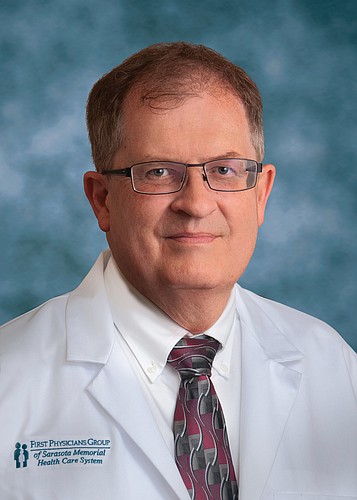- July 18, 2025
-
-
Loading

Loading

++SIDEBAR
Check-up
Practice: Carey works in robotic surgery at Sarasota Memorial Hospital
Speciality: Prostate cancer, kidney cancer and female pelvic floor reconstruction for prolapse
Years in Practice: 18
Education: Bachelor’s degree from Wofford College in Spartanburg, S.C.; Ph.D. from Massachusetts Institute of Technology; a National Institute of Health fellowship at Harvard University; received medical training at the University of Miami
++STORY
Sarasota’s own Ironman, Dr. Robert Carey is a local urologist who helped pioneer work in the field of robotic surgery at Sarasota Memorial Hospital. Since coming to SMH in 2006, Carey has performed more than 2,300 robotic procedures for prostate cancer, kidney cancer and female pelvic floor reconstruction for prolapse.
When did you first decide you wanted to become a surgeon?
Growing up, I always wanted to be one of those people that could be relied upon to be a helpful member of the community. Initially, I was most interested in becoming a scientist, but throughout my education, I found the thing that fit my personality and skillset most was interacting with human beings on a daily basis and using hand-eye coordination to be a surgeon.
How did you get into robotic surgery?
My background is in engineering and science, and I used to design and build robots to do peptide synthesis for cancer drugs, and it seemed right about that time we were developing less invasive ways of doing traditional surgery and robotic surgery. It just seemed like the perfect way to set a new course for my career.
What does robotic surgery provide that traditional surgery cannot?
The big difference is instead of making an open incision and using our native eyes and vision, we can use a camera that gives us 10 times magnification of structures. Instead of using our fingers, we can have 1 millimeter tips of instruments that would enable us to do finer dissection with better vision. One of the fundamental tenants of surgery has always been meticulous handling of tissue in the human body and the robot enables us to do that.
You’ve now done more than 2,300 robotic surgeries. Has it become an extension of your body?
It’s always strange for me because there are certain cases that I do open surgery for specific reasons. Some people say they don’t have haptics — they can’t feel through the robot. But I’ve done so many robotic cases that I have what I refer to as pseudo-haptics. When the robotic arms are touching something, my brain and my fingers controlling the robot really feel like I’m touching something.
What are some of the advancements in your field you're excited about?
We are getting exponentially better with robotic technology, meaning that we’re getting smaller and smaller, more and more precise, less and less invasive, and more and more effective in curing cancers and relieving pain and suffering in the human body.
What is the most rewarding part of your job?
The part that keeps me excited is the day-to-day interactions with patients and the ability to help them make the right medical choices for themselves. No matter how smart our patients are, when they get diagnosed with cancer, it’s usually their first time experiencing it, and the amount of data is overwhelming. A lot of times they’re in shock or pain, and that’s where being a good physician comes into play. You can help people in a time of crisis.
When you aren’t working, what do you enjoy doing?
My life outside the hospital revolves around my four children. I have two boys and two girls, ages 16, 13, 11 and 8, and whether it’s helping them manage their schoolwork or helping them get new experiences, I love spending time with them.
What’s your earliest memory of going to the doctor’s office?
I remember going in and getting vaccinated in a pediatrician’s office, and I remember having some truly awful paste put in my mouth at some point, but I’ve always been very lucky with my own health.
Who was your influence or role model on your path to becoming a doctor?
I remember when I was growing up, there was a rural dentist who was a friend of my mother. He always knew that nobody had money to take their child to the dentist, much less fill a cavity. Once or twice a year, he would say it’s time for them to come to the dentist, and we would never get a bill, and he took care of everyone like that for ages. He was a big influence because I realized he got his joy in life by helping other people with no reward for himself.
If you were stranded on a deserted island, what three books would you want with you?
Oh, goodness, that’s so hard for me. I would carry the Holy Bible, and I think I’d want [Will and Ariel] Durant’s “Story of Civilization.” I’ve got multiple volumes, but we’ll call it one book. For the third, I’d probably grab one good lasting novel with a bunch of good dialogue, either something by Pat Conroy or John Irving.
What are some of your favorite spots in Sarasota?
I love going out to Lido Beach. I just think it’s such a beautiful area with plenty of space. I also love going downtown to have dinner with friends. By far the restaurant I go to the most is Euphemia Haye. I could eat dinner there every night and never get tired of the menu. I’d gain a good 20 pounds, but I’d gladly accept it.